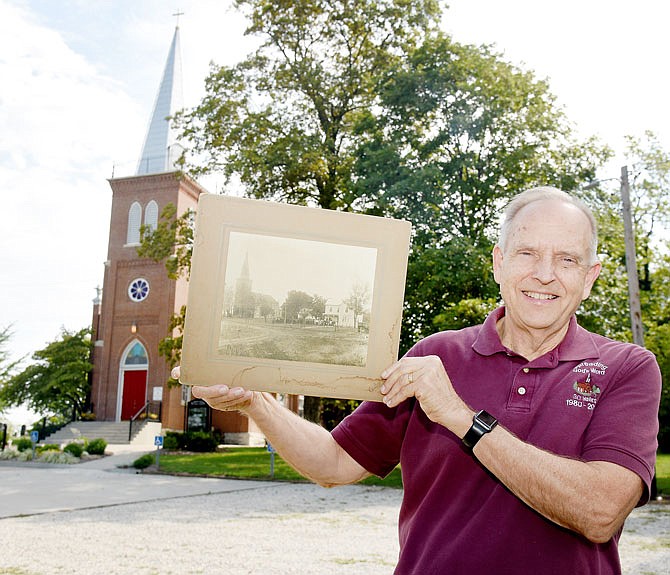St. John's Lutheran Church, at the heart of Schubert, an unincorporated Cole County community, will celebrate two anniversaries next Sunday.
Its congregation will host a dual-anniversary event for the church, which was founded 175 years ago in 1844 and organized 150 years ago in 1869, Pastor Gerald Scheperle said.
"Our day's going to be centered around giving thanks to God for the blessings that he's given to us over these 150-175 years," Scheperle said. "We're going to give thanks to God for our ancestors that carved out a spiritual congregation in the wilderness and for the foresightedness of them to minister the Gospel here in this area."
It's not surprising so many German immigrants arrived in Missouri, beginning around 1830. An 1829 book titled "A Report of a Journey to the Western States of North America" inspired Germans to leave tensions back home. More than 150,000 Germans immigrated to the United States in the 1830s. More than 7 million Germans immigrated to the United States by the 1880s.
The Prussian Union of Churches (also known by a number of other names) formed and united a number of Lutheran and Reformed denominations in Prussia.
"Germany was all in factions," Scheperle said. "There are many different Protestant denominations that developed in Europe - especially in Germany - and they wanted to bring them all back together."
The state began to pressure churches to adhere to its wishes. In some churches, pastors were told they couldn't teach or preach what the Scripture teaches, Scheperle said.
Scheperle, a native of Schubert who went away to seminary and was sent back home when he graduated, said many Germans who arrived in the area were poor.
Scheperle had a cousin, who has since passed, who contacted family that remains in Germany and researched the family history since before it left Germany. They searched back to the time when his ancestors moved from Europe. One family that arrived in Missouri was very poor.
"Their town decided it was cheaper to buy them passage to America than to support them in the town," Scheperle said. "So you've got, many times, Germany sending those who couldn't find work or who were poor over here to give them a new start."
His family likes to laugh about that ancestry, he said.
But those families carved out livings and practiced their faith in Schubert.
The new immigrants in 1844 founded the church, which was originally known as Osage Point Church and was a few miles from its current location.
The church shared pastors with Zion Lutheran Church in Jefferson City. Zion was considered the "mother church" of the circuit - the center of Lutheran activity. A cluster of nearby churches, like Osage Point, were considered "preaching stations" - destinations where pastors traveled and served churches on the Moreau and Osage rivers.
Details of the next 25 years are "sketchy," Scheperle said. Researchers have referred to baptism and marriage certificates and other documents that indicate the congregation was functioning but wasn't highly organized.
In 1869, the congregation built a log church and parsonage at the new location and organized the church as St. John's Lutheran Church.
Twenty years later, the congregation built the current brick structure.
It expanded the structure in 2004.
Much of the history will be on display during next week's celebration, themed "Built on the past; planting for the future" to accentuate the farming heritage of early settlers.
The family event begins at 10 a.m., with a morning worship in the church at 4409 St. John's Road. The worship will feature guest speaker the Rev. Miguel Barcelos from Portugal. Barcelos recently graduated from Concordia Seminary in Fort Wayne, Indiana. He's been assigned to return to Portugal to serve as a pastor and will be the first indigenous Portuguese pastor from the Missouri Synod. The Missouri Synod includes about two million members and is a traditional, confessional Lutheran denomination in the United States. It is the second-largest Lutheran body in the country.
Barcelos got connected with Scheperle and his family through Scheperle's daughter. A speech therapist, she wanted to see the world and get paid for it, so she joined the U.S. Air Force. While stationed at Lajes Air Force Base in the Azores, she attended a "little bitty Lutheran church meeting" in a home. It was the home of Barcelos' parents.
Dinner will follow the morning service.
"We're providing dinner for whoever comes to be with us," Scheperle said.
Following dinner, attendees will regather in the church for an old-fashioned hymn sing.
"We've got a couple of reed organs," he said. "We'll use one of the old-fashioned organs we have here in the church."
Descendants of some of the early families are expected to attend.
"We'll introduce them and some of the guests and discuss some of the fun history down through the years," Scheperle said.
Afternoon service (an anniversary service at 2 p.m.) will feature Nabil Nour, the fourth vice president of the Missouri Synod.
Then there will be a reception, Scheperle said, "with plenty of time for fellowship and greeting."

